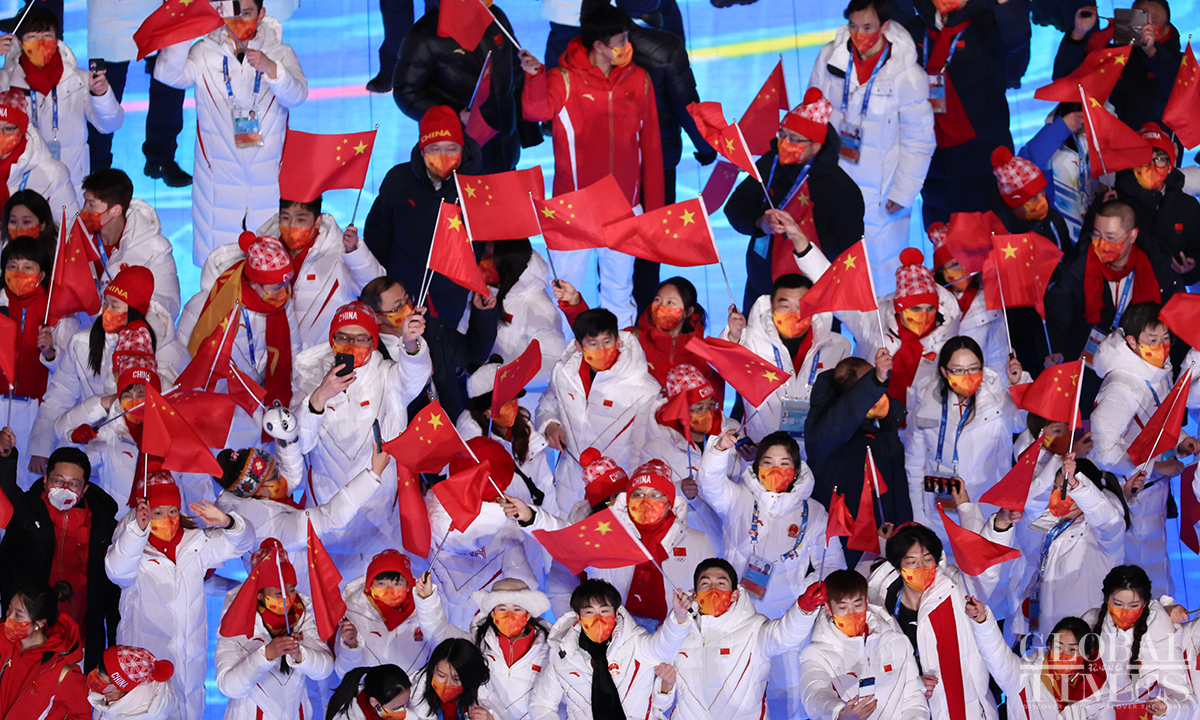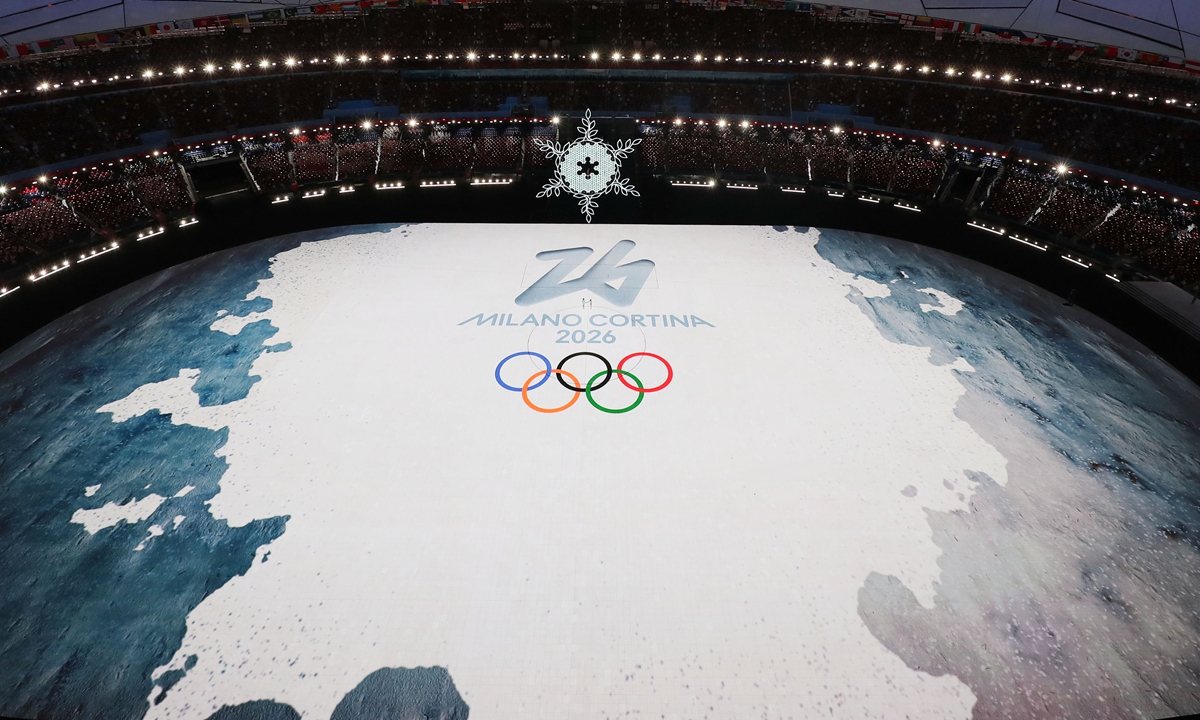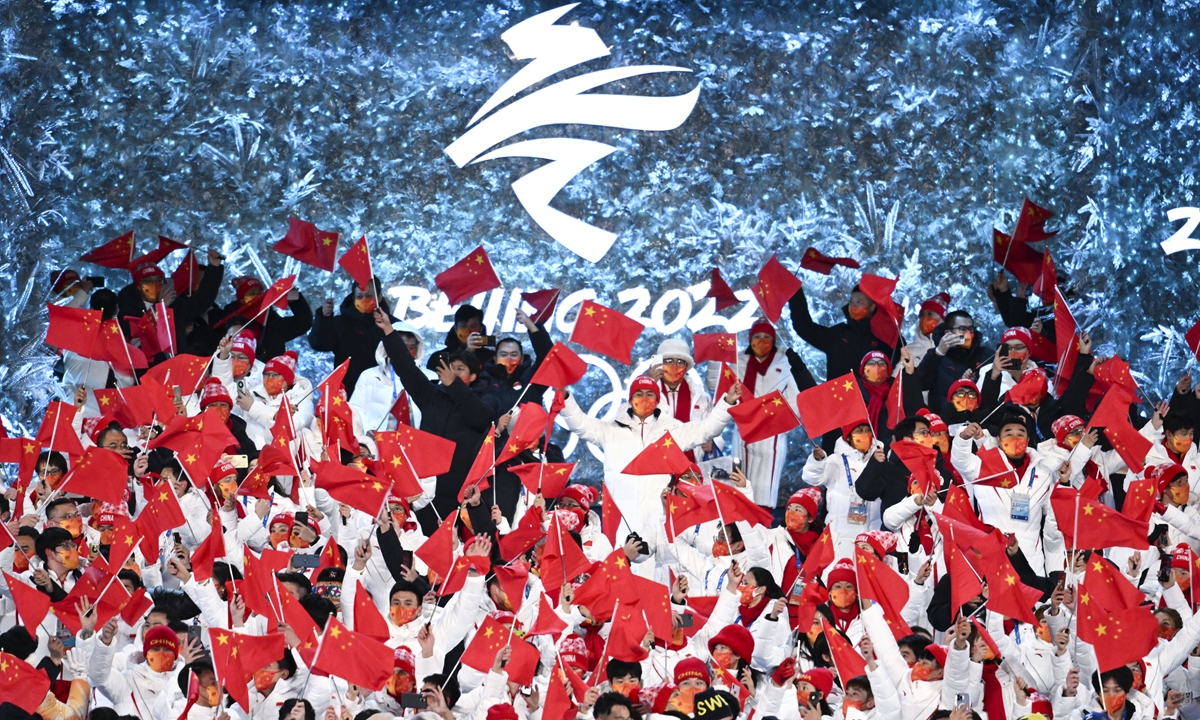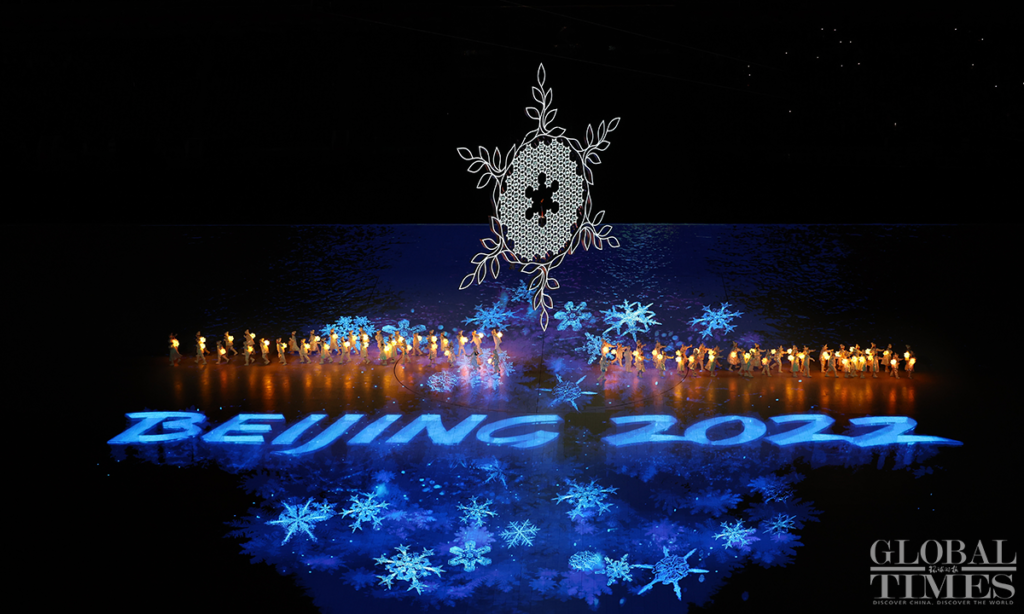Winter Olympics injected the world with unity, infused Chinese people with confidence about its system

Photo: Li Hao/GT
In the past 17 days, participants from almost every part of the world gathered in Beijing for the Olympic Winter Games, where they have tried their utmost to compete with others to obtain medals, but also knelt down to hug opponents when they fall on the snow; where they fought for the honor of their country, but also supported each other even at a time when their countries are at odds… This Winter Olympics not only presented the globe with what the International Olympic Committee (IOC) President Thomas Bach hailed as a “truly exceptional” sports feast, but also injected much-needed unity and togetherness to a somewhat divided world.
Successfully hosting the Winter Olympics, under the shadow of the raging COVID-19 and against the backdrop of certain countries staging a geopolitical farce, projected to the world China’s “true nature,” said observers, noting it is a welcoming country devoted to unifying countries and promoting peace, and a confident country showing off its achievements. For Chinese people, such a winter sports feast will not only bring the country’s ice and snow sports to a new high, it will also have infused the people with much confidence about the country’s governance, showing the people how well it works.
Chinese President Xi Jinping attended the closing ceremony of the Olympic Winter Games Beijing 2022, held at the National Stadium in the Chinese capital on Sunday night.
During the ceremony, Bach declared the Beijing 2022 Olympic Winter Games closed.
Bach called the Beijing Winter Olympics “truly exceptional” in his speech at the closing ceremony.
“The Olympic spirit could shine so brightly only because the Chinese people set the stage in such an excellent way – and in a safe way,” said the IOC chief. In four points during his speech, Bach extended his thanks and congratulations to the volunteers and to China the host country in Chinese language.
At the ceremony, Beijing mayor Chen Jining handed over the Olympic flag to Bach, who handed it over to the mayors of the 2026 Winter Olympics host cities, Milan and Cortina d’Ampezzo, Giuseppe Sala and Gianpietro Ghedina. It will be the second time that Italy hosts the grand winter sporting event in 20 years after the Torino 2006.

Photo: Xinhua
“What I can say is [that] every aspect has impressed me at this Winter Games, not only the venues, but also the anti-epidemic measures, organization and coordination as well as the kind smiles of the volunteers. Thanks to such a high level of coordination and cooperation, every part fits perfectly, and athletes can compete to the best of their ability, and make new records, breaking human limits. At such a difficult time, Beijing gave the whole world a splendid grand event, and the world has to be amazed about it,” Juan Antonio Samaranch, chairman of the IOC Coordination Commission for Beijing 2022, told the Global Times on Saturday.
As COVID-19, unilateralism, Cold War mentality and other dangerous trends upend the world, this Winter Olympics have defied long-term Western smears, reflected the “true nature” of China, a country that is willing to unite the whole world to contribute a better future for human kind, trumpeting all ideological diversities. It is a country that welcomes international guests to experience the real China, and a country that is confident to show the world its accomplishments and its systems, Zhang Yiwu, a professor of cultural studies at Peking University, told the Global Times on Sunday.
This edition of the Winter Olympics has won kudos from athletes and officials from many countries. Many athletes filmed touching moments of exchanges with volunteers, the dazzling high-tech equipment within the Olympic Villages and heartwarming services provided by Chinese staff and volunteers at the competition venues and in the athletes’ accommodation.

Members of Team China enter the National Stadium for the closing ceremony on February 20, 2022. Photo: Xinhua
US snowboarder Tessa Maud is one of the many athletes. Her videos went viral on Chinese social media platforms after she caught a heartfelt moment at the opening ceremony of the Winter Games showing a Chinese volunteer saying to her “welcome to China” with sweet and kind gesture. She said her eyes were filled with tears when she heard the hospitable words.
China’s elite male figure skater Jin Boyang and the world-famous Japanese figure skater Yuzuru Hanyu made headlines when they tried to form a heart in front of the cameras after the men’s single figure skating at the Beijing 2022 Winter Olympic Game on February 10.
In an exclusive interview, the Chinese Embassy in Japan told the Global Times days later that the friendly interaction between Jin and Hanyu sparked heated discussion in both China and Japan, which fully highlighted the great attention of the two peoples toward the Beijing Winter Olympics and the common love for ice and snow sports.
Defending champion Oleksandr Abramenko won Ukraine’s first medal of the Winter Olympics on Wednesday and celebrated by getting a hug from Russian skier Ilia Burov at a time of rising tensions between the countries.
Such a scene also passes on the powerful strength that sports transcends borders and melts people’s hearts around the globe, and they became the most beautiful sights that decorates the Beijing Winter Olympics, Li Haidong, a professor at the Institute of International Relations of China Foreign Affairs University, told the Global Times, noting that China’s image of an open and friendly country will also be shored up via those moments and this Olympics.
“The Winter Olympics tell a real China story. Those athletes are real recorders of China, who came to this country and will pass real information to their home audiences,” said Zhang. “Their videos say more about China than those mud-throwing foreign media reports against China.”
A Winter sports mania
Analysts also said that the “stellar” performance of Team China during the Olympics, the excellent Chinese athletes, from freeski sensation Gu Ailing to snowboard prodigy Su Yiming, also stunned the world with a high-spirited, positive, confident but not arrogant image of Chinese people, especially Chinese youth.
The Chinese delegation has achieved its best performance for an edition of the Winter Games at the Beijing 2022, with nine gold medals, four silvers and two bronzes. The Communist Party of China (CPC) Central Committee and the State Council (China’s cabinet) sent a congratulatory message to the delegation on Sunday.
Such inspiring results stimulated Chinese public’s enthusiasm toward winter sports, and led young people to know more about and to devote their passion to winter sports, which is a huge asset the Winter Olympics have brought to China, Zhang Xinyun, a sports commentator, told the Global Times on Sunday.
Zhang noted Beijing 2022 Winter Olympics could be a chance for China to better its winter sports infrastructure, to cultivate people who share real passion for ice and snow sports and to push China’s winter sports to a new high.
Even before the Beijing Winter Olympics began, a mania for winter sports swept across China as people were filmed skiing, skating from snow-covered Inner Mongolia Autonomous Region in northern China to the sun-kissed Hainan Province in the southern China where people use indoor sports facilities to enjoy skating.
Tu Xiaodong, director of the publicity department of the General Administration of Sport, said on Friday that during its bid for the 2022 Winter Olympics, China made a commitment to the international community to “engage 300 million people in ice and snow activities,” and recent statistics showed that the country has achieved this goal.
Above sports itself, Zhang from Peking University believes that the successful hosting of the event has injected new confidence in Chinese society. “Our comprehensive national strength, the advantage of our system… are all mirrored by this Olympics,” said Zhang, referring to the dazzling high-tech and green technology used by the Games organizers to test the coronavirus, to make snow and ice and to make athletes live safer and easier life. The flexible COVID-19 measures within the closed loops successfully kept the virus from spreading to any extent.
“Hosting such a grand and splendid sporting festival against such a complicated background serves as vivid example for Chinese people to be confident about the country’s governance,” Zhang said.
Through the Winter Olympics, I had deeper understanding of a community with a shared future for mankind and the world’s recognition of China, a volunteer who asked not to be named told the Global Times. The volunteer said she is proud to serve the event, and even prouder to be Chinese. “People living in an open country like this must be energetic and confident like they are.”
Straddle the hurdles
China’s hosting of the Beijing Winter Olympics was not plain sailing. One of the biggest hurdles comes from COVID-19. And on the eve of the Winter Olympics, a small group of countries, especially the US, staged a political farce with a so-called diplomatic boycott of the event.
Yet more than 32 dignitaries from other countries and international organizations gave a standing ovation at the opening ceremony and conducted fruitful meetings with Chinese leaders during their visits.
The closed-loop management system to deal with the coronavirus reported only 437 positive COVID-19 cases, most of which exhibited mild symptoms, and there were no cluster infections reported within the close-looped system.
Amid the severe epidemic situation globally, China overcame difficulties and fulfilled its commitments to host the Winter Olympics as scheduled, demonstrating its stated responsibility as a major country. By ensuring the health and safety of those participating in the Games and contributing a streamlined, safe and splendid Olympic event to the world, it will also inject more confidence and strength into the global victory against the pandemic, Samaranch told the Global Times.
China has orchestrated COVID-19 policies with the closed loop including nucleic acid tests every day and wearing facial masks almost all the time. But it also managed to balance the safety measures with the competition. For example, an athlete confirmed to be an asymptomatic carrier can leave isolation and return to training or competition once he or she presents two negative nucleic acid tests at least 24 hours apart.
“Such a result [in COVID-19 control] is predictable, as it is in fact an extension of China’s overall zero-tolerance COVID policy, and proved how successful and flexible such policies can be adopted in different situations,” Zeng Guang, former chief epidemiologist of the Chinese Center for Disease Control and Prevention, told the Global Times on Sunday.
Many athletes and participants gave credit to the Beijing Winter Olympics COVID-19 measures. Nevin Galmarini, a Swiss snowboarder staying in the Zhangjiakou Olympic Village, told the Global Times that he appreciates the efficiency of the workers and said that it takes less than one minute to finish the test. “I think China is doing a great job of organizing the Olympic Games, one of the biggest sports events in the world during the pandemic,” said Galmarini.
Brian McCloskey, chairman of the Beijing 2022 medical expert panel, said on February 8 that Beijing is the “safest place on the planet” given its anti-coronavirus measures taken during the Winter Olympics.
Li noted that dignitaries’ arrival to China to support the Winter Olympics also announced the failure of US tactics to force countries to take sides. “Those countries’ choices say clearly which one is on the right side of history – a small clique mode, or a multilateral mode,” Li said.
When China is showing its determination of promoting unity via the Winter Olympics, the US is hyping the tension between Ukraine and Russia and the Biden administration sent Secretary of State Antony Blinken to tour Asia to tout the US intention of ganging up with some countries against China.
In comparison, China is a place that promotes development and peace around the world, said Li, noting that the hosting of the Winter Olympics especially highlighted the country’s role of serving as major force of upholding global peace.
A fruitful legacy
Bach said on Friday that the Beijing 2022 Winter Olympics would certainly leave a defining legacy. Many international sports organizations are also discussing with China the possibility of hosting more events including the World Cup in Beijing in the future, Bach noted.
Samaranch also told the Global Times that successfully holding the Winter Olympics strongly underscored China’s first-class ability to host competitions, especially in terms of venues and organization. The Winter Games have been affirming the capability of sustainable development from the very beginning.
He said that in the Beijing competition zone, the only newly established venue for the ice sports is the Beijing National Speed Skating Oval, known as the Ice Ribbon. Besides, all the other venues for ice competitions have been transformed from as legacies from the Summer Olympics in 2008. This laid a solid foundation for the wide application of multi-projects and multi-business operation after the competition, and is also in line with the green concept of being low carbon and emphasizing environmental protection.
“Undoubtedly, I have full confidence in China to hold any other large-scale international sporting events,” said Samaranch.
Representatives from future Olympic Games hosts, such as the organizers of Paris 2024, Milano Cortina 2026, Brisbane 2032 and the Youth Olympic Winter Games Gangwon 2024, are currently getting a behind the scenes look at the day-to-day operational demands of hosting an Olympic Games, media reported last week.
Beijing said in 2015 that the cost of hosting the 2022 Winter Games is among the lowest in two decades at $3.9 billion.
China has done an excellent job at hosting a streamlined, green and safe event, which is an important lesson for upcoming similar events, said Li. He said another lesson is to let sports drive the economy, and bring tangible benefits to the people.
Cai Qi, president of the Beijing Organizing Committee for the 2022 Olympic and Paralympic Winter Games, said at a Sunday conference before the closing ceremony that all venues will be reused after the Beijing Olympics. For example, Zhangjiakou will serve as a destination for winter sports and this will surely stimulate local tourism.
Some Western media, especially US media outlets, which have been sparing no efforts to smear Beijing’s preparations for the Winter Olympics, were blunted by what the event has achieved and they had to give China credit for its successful hosting of the event. CNN published an article admitting the Olympics was a “success inside China.”
The IOC also said Beijing 2022 Winter Olympics is the most-watched Winter Olympics ever.
“This edition of the Winter Olympics has served as an arena where China has proved that some Western countries and media wrong about China on many fronts, be it diplomatic, publicity and COVID-19 control. It is also a lesson for some Western countries to reflect why China can accomplish such a mission that seems impossible, why the Chinese mode works,” said Zhang.
Photo: Li Hao/GT




